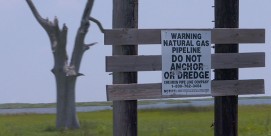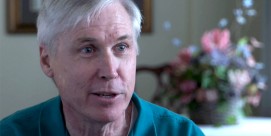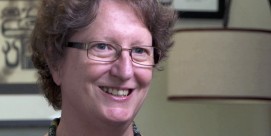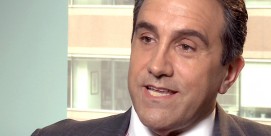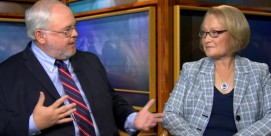In This Episode << SLIDE LEFT TO SEE ADDITIONAL SEGMENTS
Rep. Mark Souder Extended Interview
Read more of Lucky Severson’s interview about evangelicals and politics with Congressman Mark Souder (R-Indiana):
Your congressional seat was once held by Dan Coats and Dan Quayle.
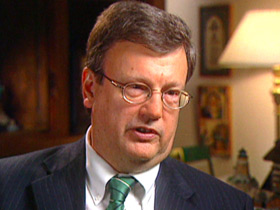
From 1970 to 1976, it was Ed Rausch, who was a Democrat. Then Quayle defeated him and was in four years. Then Coats won for eight. Then a Democrat, Jo Long, took the seat when Coats moved up to Senate. Then I turned around and beat her. She had three terms. There were twelve years of Democrats and twelve years of Republicans. Then I came in and kind of stabilized it. So it was kind of back and forth a number of years. It wasn’t a straight line. But it is accurate to say it was a seat that Coats and Quayle held.
And it’s a fairly conservative area?
Yeah, the Democrats are relatively conservative. This is kind of tricky. It’s accurate to say that the district I currently represent is Republican. But up until this last redistricting, probably it went Democrat for governor 58 percent. [Birch] Bayh has never lost a single county in the district, even when he won statewide with 52 percent. So it’s a conservative social district, but it has two-and-a-half times the national average of unions. That’s really probably the defining thing. Ross Perot got 18 percent in his peak year. Because of the unionization, the industrialization, it’s a Republican social issue district, but a swing economic district. And so it goes back and forth.
It’s always a struggle?
For me, it’s easier, because I am more populist on economic issues. I do better than a typical Republican [with African-American voters]. I might get 12 percent where the rest of the ticket gets 8 percent; where they get 15 percent, I’ll get 20-some. Where I get opposition is some of the country club Republicans don’t support me as much. But I’m a different breed, as was, quite frankly, Dan Coats — a little more populist breed. So it’s correct to say it’ll be Republican for president, but it’ll be split down the ticket. It’s just a different nature that’s always kind of resistant to. … Now I have a much safer district; but every other election, it was like a brawl. At any time, it could go back to being Democrat again. Interestingly, I am the second longest any member has ever served, going back to the beginning of Indiana, in our district, because it’s historically back and forth.
What was your childhood like — your religious upbringing then and your religious life now?
I go to a United Brethren in Christ church, which is Anabaptist, very conservative. Most people would call it fundamentalist, but it’s somewhere between fundamentalist and evangelical.
My first big election battle was after I got elected at Leo High School, which was a little high school. My class [size] was 68 after the Amish dropped out, 80 before the Amish dropped out. I got elected to eighth-grade class president, in junior high and high school together. Our big controversial vote that year was whether to allow a sock hop, a dance, at the school. It passed by one vote. The Apostolic Christians, like myself, the Mennonites, United Brethren in Christ, would have been against dancing. The more liberal people, who would be the Missouri Synod Lutherans, the Missionary Church, and so on, wanted to have a sock hop. We weren’t arguing about real radical things; we were arguing about basic dancing. I would be part of the fundamentalist evangelical movement that still has doubts about dancing. We’re not arguing about abortion; we’re arguing about whether you should go to a dance.
Didn’t your parents believe that you should not participate in sports?
In many fundamentalist Anabaptist organizations, the tradition is that you don’t get baptized into a conservative faith; you choose that. You reach an age of accountability when you decide, if I don’t accept Jesus Christ as my personal Savior, I’m going to go to hell. And that age of accountability — up till then, all children go to heaven. They’re not going to go to hell because God forgives them; they don’t fully understand. You can’t really join a church when you find out you can’t play basketball, you can’t go to a movie, you can’t go to a dance. You can’t have a seven-year-old come forward in church and commit to these Holiness churches, would be another way to say it.
At a point you make a decision for Christ which, typically in the denomination I grew up in, would more likely be after you’re out of high school or into college. I made an unusual decision in that sense, because I did it between my junior and senior year in high school. My parents were very conservative. They tried to give me alternatives, did not force me. They didn’t tell me I couldn’t be in sports, but they said, “This is what we don’t do.” Even though I wasn’t a member of the church at that time, I didn’t participate directly in sports even though I was sports editor of the paper. I couldn’t go to games after I became a Christian and joined the church.
My parents looked to say, “If we’re going to restrict his behavior as members of the Apostolic Christian Church, what interests can we do? Rather than just say no, what can you develop in a positive way?” So they encouraged interest in me as a young child in music, so I played the French horn. My parents then tried to give capitalist incentives — my dad was a businessman — to say, “What alternatives can we develop?” Because I was a little capitalist and earned 35 cents an hour sorting pop bottles down at our general store, I would use that to go out and buy baseball cards, which turned out to be a great investment, from the early ’60s — lots of Mickey Mantles and that type of thing. But they told me then, because I was spending all my money on baseball cards: “If you buy nonfiction books that are nonsports, we’ll pay half.” So my little capitalist mind — because I liked to read anyway and always was an avid reader, I started to get interested in history and politics. Then they broadened it, if my mom cleared the literature — like Shakespeare or Dickens — or if I bought classical music. In a positive way, they tried to steer me rather than saying just no — develop other interests. When I became 15-16-17-18, I was more interested in student government, more interested in working on the student newspaper, more interested in being in band than necessarily lots of the other interests. It wasn’t as painful to me to make that kind of adjustment in lifestyle.
Did you imagine then, when you started reading and getting interested in politics, that you would become a politician?
In a little town, you hope that maybe you can get a staffer for a county commissioner to sometime know where the town of Grabill would be. Now it’s a little different, but back then we were much isolated. It never crossed my mind. Furthermore, I thought Washington, DC, if it wasn’t hell, it was a suburb of hell. The classic thing that I would hear growing up is: “Well, you might be able to provide a little salt, but they’ll suck you up, and then they’ll suck the salt out. You’re too small to really influence a city like that.” In fact, in our denomination, one person had been a state senator in Illinois, but nobody had ever gone beyond that. There are very tough questions in the Anabaptist pacifist tradition on war, on capital punishment, on lots of different issues — funding questions, what do you do on Sunday. Lots of tough questions — whether you go to receptions where people are drinking. Whether you wear a tux and go to places that are highly formal with dances. All those kinds of things were kind of contrary to this very conservative Holiness lifestyle. So I never conceived of it. Not only was I from a small town, from a family that didn’t have much money and that worked hard, but even philosophically and with my religious background I never really conceived of that. … If you talk to people in my school, they would say, “He’s going to be a politician,” but that’s because they didn’t understand where I was mentally. I thought maybe I could influence politicians, through writing or other things, but I never thought I’d be one.
Karl Rove has said that four million evangelicals failed to vote in 2000.
“Evangelical” is a very broad term. Often, when it’s talked about in the media, or even sometimes my conservative Republican allies will say, “All these evangelicals aren’t voting.” First off, almost all African Americans call themselves evangelicals, but that doesn’t mean they’re going to vote for conservative Republicans. Secondly, in the evangelical movement, there are lots of liberal evangelical churches that may have different views on the war in Iraq, on socialism versus capitalism. And then there are many people in every church who don’t go to church. The key question is: Are you a conservative evangelical who goes to church on a regular basis? On that [basis], it’s a growing number [of evangelicals] in Congress compared to, say, 20 years ago. I want to make sure that those who share our values and understand politics turn out to vote, not just those who pay lip service or who don’t understand. I’m one who believes that if you don’t take the time to learn what you’re voting about, and if you don’t care enough, as easy as it is to register in the United States, if you don’t care enough to register, if you don’t care enough to pay attention, I really don’t want you voting. That’s why we’re a republic. The people who will inform themselves participate, because it’s so easy here. We want knowledgeable voters in the system. I don’t think all those four million are going to vote our way. I have a little difference of opinion about the silent majority, but we ought to identify responsibly from our party those who share our values and make sure they vote.
Have you felt a certain prejudice in the nation’s capital, being an evangelical congressman? Has it been difficult for you?
I thought it was going to be harder. As a staffer — because I came out here first as a staffer and then went back home, was there for a while and ran for Congress — it was more of a novelty. When I came into the conservative movement as a young person, I came in through Young Americans for Freedom, which was in the ’60s the big conservative alternative — the William Buckley/Barry Goldwater/Ronald Reagan young conservative movement. When I grew up in the conservative movement, it was defined pretty much by Catholics and Jews, and there weren’t evangelicals in the political movement. So my terminology and my frame of reference and the people that I knew in the political system talked differently.
The evangelicals really didn’t start to come in until ’76 and towards 1980 and start to get involved in the political system. So my background is more really neocon, even though I am an evangelical. Then, when I came to Washington as a staffer, you started to see that transition — more and more openness [to] the evangelicals in the ’80s.
In 1994, when I won, it was the biggest single wave of evangelicals, because when Bill Clinton was president, some of his first actions — homosexuals in the military, openness on that issue; his three initial actions to repeal everything Reagan and Bush had done on abortion — activated social conservatives. Health care came later. The tax increases came later. The defense policies came later. But the social conservatives were activated. So in 1994, we brought a wave in of really not just lip service evangelicals.
The Campus Crusade for Christ Christian Embassy, as it’s called here — Bible study on the Hill — went from about 10 members to, all of a sudden, 40. The hard-core, conservative evangelicals jumped up. When I came here, we were part of the big wave. Gingrich even came to one of our Bible studies. Wherever there were three conservatives gathered, he found us, because he was looking to figure out what these freshmen were doing. We came in as a big wave. The discrimination against us was not as pronounced, because there were so many of us. At a pivotal time, we were now suddenly in the majority. We were trendy new kids on the block. It was different when my former employer, Dan Coats, was here. People didn’t quite know what you were. The media didn’t quite know what you were. I think there was a little more prejudice.
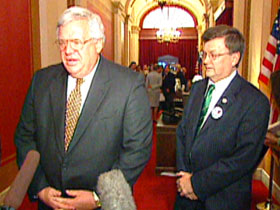
What are the big issues right now with evangelical politicians in Washington?
The evangelicals are pretty much like the rest of America. If you said to evangelicals in my district, “What’s the number one issue?” Jobs. Number two, terrorism. Number three, war in Iraq. Number four — and maybe even jumping to the front, depending on the family and the pressures — health care. If you’re a senior, it’s Medicare.
The things that are more uniquely evangelical — because we’re just like everybody else, with the same pressures as everybody else — but what is uniquely evangelical, there is a deep-seated concern about the homosexual marriage question. Probably the single biggest issue is the courts, which people blame for that decision. They blame the Senate for not moving the more conservative nominees from President Bush, so the court question has superseded even the homosexual marriage question or the abortion question. You would see a lot of concern about Janet Jackson or Howard Stern, but really those are the epitome of the kind of coarseness of the public media today.
What influence are evangelicals having on foreign policy issues?
Evangelicals are having a big impact on foreign policy, but in different ways. Just like all blacks aren’t the same, all Hispanics aren’t the same, it depends where you were. We have different evangelical blocs that are influencing different parts of foreign policy. The fundamentalist tradition that I am out of says, “Stand with Israel at all costs.” It’s one of the ways you measure, just like abortion: Do I understand that Christians are grafted on? That God gave Israel to the Jews? And we [evangelicals] are stronger, in many cases, in support of Israel than the national Jewish population is in support of Israel. A different type of foreign policy [issue is] human rights questions. Different branches of the evangelical church will be more concerned about human rights. Then you have the religious liberty question, which unites the more liberal and conservative branches of the evangelical church. That would be Sudan and Egypt and Syria; even in the constitution of Iraq, where it’s become a question about religious liberty.
Mission organizations are huge in my district, because I have United Brethren in Christ, Church of the Brethren, Mennonite, and Missionary headquarters, as well as a huge Catholic Charities and Lutheran Social Services that bring refugees into my district and have huge mission organizations. In my district, Haiti is a big issue, because so many have been down in Haiti. I met with a group of a hundred different people from Africa one evening — 20 countries from Africa — that have been brought in. And, all of a sudden, they’re asking me to get involved in African issues. …
On some issues, are you willing to compromise to reach certain goals?
Yes. I believe that there are some issues. The way I would work this through in my mind is, the closer to the clearness of the Bible, the less ability I should have to compromise. So I view, on abortion, there’s really not much room to compromise. On certain very difficult issues, because I have friends who are homosexual — gay — but there just isn’t much room to compromise. On other issues — faith-based organizations and how we do that funding — there’s a lot of lack of clarity in how we work this through, how we precisely work through stem cell lines and adult stem cells from embryonic cells — you have some room to try to sort this through. How we deal with the question of rape, how we deal with spouse abuse and domestic violence. A lot of times, evangelical Christians don’t work through these issues and try to figure out those types of things. And we need to be concerned about how we deal with poverty. It isn’t absolutely clear, even though I am a hard capitalist, that there isn’t a role for government. Where should that role be? What is our responsibility, when we’re public officials, to try to address that? There is not one clear biblical answer in any tradition that says there’s a certain way to do that.
On foreign policy matters, are you concerned about the separation of church and state and getting involved where you shouldn’t be?
Let me separate that into two parts. There is all foreign policy, and then there is Israel. Let me do foreign policy first. I think that you need to be very careful about being too ethnocentric when you try to go into countries like Iraq, Afghanistan, how we deal with North Korea, how we deal with Russia, how fast they can move, what their histories are. I’ve learned more about the differences between Shi’a, Sunni, northern Kurdish Shi’a from southern Shi’a, who may be more like Iran. You have to be understanding [of] the process they’re going through. Even as a Christian, if you wanted to witness, you need to be like the apostle Paul, who understands, when he goes in an area, what an area will take and how they would adjust. It’s just logical that not everybody is going to agree with you.
Israel is a different subject. I went with the American-Israel Public Affairs Committee to Israel. We were the first group, right after we got elected in 1994, that was all evangelicals. The guide said, “You’re our favorite group, because for you the history of Israel is the Bible, then silence, and then 1948 on.” We don’t have a sense for what really happened in between the end of the Bible and 1948, when the state of Israel was created. That does give us kind of a distorted view of history in the sense of human terms, but we believe, in this case, it is God’s chosen people with a unique mission, that they’re going to stumble and there are going to be problems, but it’s unique.
So when you come to a question like the wall, I would prefer, just personally, that Israel handle things a little bit differently from time to time. But the bottom line is, they’re God’s chosen people. He’s going to stand with them. The question is: Are we going to stand with them? Because God’s going to stand with them. And once that drives my impression, it doesn’t preclude me from doing more sophisticated things as well. But it does say that I’m going to stand with Israel. I’m the only person from my denomination who was a member ever to go to the University of Notre Dame. There, they have a branch in Israel that’s trying to work with Palestinians and young Jews. They said, “Look, we’ve got to figure out how to get along long-term. This fighting is one thing, but long-term we have to have some solutions.” I know Christians, and I’ve talked to Christian Palestinians. Even in talking with the leaders of Israel, they realize Palestinians aren’t their number one problem. What’s more, we’ve got to figure out how we’re going to live together. To them, Syria and Iran, and for a while Iraq, are the longer-term problems. The Palestinians are a poor people who get pushed around by everybody. But the bottom line is, the Palestinians continue to terrorize Israel; there is going to be this reaction. And the question is, How can we get the young people to work together better, long-term? But there is always going to be conflict in that region — whether it’s the Palestinians or others. The fact is, [for] many nations in the Arab world and in the Muslim fundamentalist faith, the literalists there, Israel has to be destroyed from the face of the earth. And if you really believe in a fundamentalist Bible, the Book of Revelation is pretty clear.
Is part of the motivation here converting Jews?
No. There are movements — Jews for Jesus and other groups — that try to convert Jews. I believe, like most fundamentalists, that the Jews didn’t understand that Christ came back the first time. And when the Second Coming occurs, the leaders and those who are devout Jews will be the first to rally around him. And they may recognize him more than many of the so-called Christians in the world. We have the same Old Testament. They just believe that Christ hasn’t come back for the first time. We’ll see it as the second time; they believe it is the first. So there is no real need to convert them, because they’ll be converted. That is pretty much the fundamentalist doctrine.
They’ll be converted by Christ?
Yeah. One of my pastors when I first moved to Washington as a staffer — Barry Leventhal was a Jew who became a Christian and made the Old Testament sing. And Lon Solomon at McLean Bible Church is another Jew who’s become a Christian and has a big following here in Washington. But that isn’t the primary goal. I don’t support Israel because I think they’re going to be converted; I think that they’re wrong in many cases. All of us are wrong at different times. But they’re God’s chosen people. And he gave, in the Old Testament, Israel to the Jews, more or less, right or wrong. They were going to drift. At the end, they’ll come back. And with that kind of confidence, it doesn’t mean there’s not going to be drifting, it doesn’t mean we shouldn’t try to influence their policy and say, “Look, can’t you kind of cool it here or there? Maybe a settlement — back off here or there.” On the other hand, it’s pretty clear that some fundamentalists would be harder-line than the government of Israel about which areas they should be giving up, because God gave them certain areas, and yet they’re negotiating some of the areas away that maybe God gave them. So sometimes the fundamentalists would be worse to be negotiating than even [Ariel] Sharon — which is an irony.
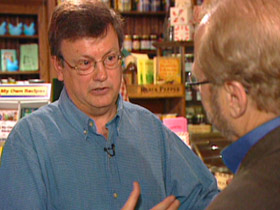
What about some other issues, such as the budget deficit? Does that trouble you?
There are, in the evangelical movement and fundamentalist movement — which I don’t see as totally, exactly the same, but I’ll use “evangelical” for both purposes of this — in the evangelical movement there are divisions. There is a movement that says, “Owe no man anything,” which means don’t have any house debt, don’t have any car debt. If you are part of that movement, it would be inconsistent to back federal budgets. But if you believe in having a bigger house payment, bigger loan, as you get more income; if you believe in having a bigger car payment as you get more income, then you’re focused not on deficits; you’re focused on what is the deficit in relationship to the growth of the economy. If, in fact, we suddenly collapse and go to no deficit, we’ll cause a recession, in my opinion. That’s why I say I’m more of a neocon; I’m not a libertarian. Therefore, I believe there is a role for government. I am concerned that the deficit doesn’t get too big, but as my economic guru, Jack Kemp, would say, I don’t worship at the altar of a balanced budget. I believe the key thing is economic growth. If people get the tax cuts, if they can reinvest money, they’ll create an engine of growth, which is the only way you really eliminate a deficit.
How many evangelicals do you think are also neoconservatives?
There’s not as many who understand the term, because it may be more that just believe that way. But there are, around the country, many people, for example, in any evangelical church who would support programs in health care for the poor, who would say, “I believe in vocational education,” who say, “Congressman Souder, can you do this over here for this particular kid who has special needs in education?” They aren’t saying, “I have a philosophical opposition to the federal government.” They’re saying, “There are particular needs here; can the federal government do it?” Then there’ll be other ones who come up in church and say, “Federal government ought to just get out of everything. I don’t understand why you’re doing this.” But I think it’s close to 50/50, even in conservative churches.
Is there a movement among some evangelicals who think that the administration has not protected the environment enough?
Yes. They tend to be more liberal on a number of other issues. I’m a little more moderate on environmental issues. Now, an environment group will tell you I’m not moderate. I’m a big supporter of the national parks, but I also represent a district that is very manufacturing oriented, and therefore, in my area we make things that suck up gas when you use them — we’re the biggest area for making pick-ups or SUVs. We design the big international trucks — number one in recreational vehicles in the United States. The Hummer — most of the parts come from my district, and it’s made next door. We make things that use a lot of gas. So when you come to whether we should drill, really Christian concerns get mashed up with job concerns and other type things.
But many evangelicals believe that God created the universe, the Earth, and everything in it, and that we are stewards. While we have dominion over the earth, if we absolutely need an area for energy, we should balance that out with the environment, but it can be used. But we also have an obligation to protect the grizzly bears, to protect the parks, to work these things in balance. At what place does going for too-clean air put your neighbor out of work and they can’t support their family, they start drinking, they beat their wife? At what point does having the air clean make it better for all of us and protect God’s universe for our children? There are those evangelicals who are deeply involved in that question, trying to think it through. But it isn’t as conspicuous, because we’re doing that trade-off. So they aren’t as likely to be involved in the environmental movement, which doesn’t really look at that kind of trade-off and balance. But they are also a little nervous about this “Drill anywhere, use the Earth as though it’s kind of an industrial division of the United States.” So there is an uncomfortability. I don’t know that it’ll play through in the election precisely, because other issues will trump it. But I think there is some uncomfortability at the administration pushing too hard in reaction to the Clinton administration that pushed too hard the other direction.
A lot of the environmental movement has been captured by almost an antireligious segment that worships nature in and of itself. And the environmental movement also is a big promoter of evolution — that we all evolved from some amoeba, and therefore we ought to treat the grizzly bear [well] because it’s our ancestor. That turns off a lot of conservative Christians to the environmental movement. But if you ask them, “Where would you like to go?” “A national park. I like to camp.” “Why? Why do you like to watch the sunset?” “Because it’s God’s creation. I feel closer to God. I want to have this preserved for my kids.” There are consensus items where we could work, if it wasn’t seen many times by the radical environmental groups and the liberal environmental groups as almost anti-Christian.
You use the words “radical and liberal.” People probably use the words “radical and conservative” about you, right?
Um-hm. I would define myself as an ultra-conservative.
A radical conservative?
“Radical” might be a little hard. “Ultra” would be … on social issues, I’m very conservative; on some other issues, I’m moderate.
On social issues, do you think our country is in peril?
Yeah. I’m not a pessimist, however, and I’m not one of those people who believe we’ve fallen from this wonderful Christian pedestal, where everybody who came first to America was a Christian and everything was just jim-dandy at the beginning, and now we’ve just fallen off the wagon; the spiritual country has become this terrible place. The truth is we were a mixed bag from the beginning. If you look at the settlement of the West, there were more bars and whorehouses than there were churches. The churches came in later. We were a mixed country. We were not a Christian nation; we were a nation founded [on] Judeo-Christian principles and the remnants of Christian civilization, with many Christians in it. I would even go so far to argue that from a conservative Christian perspective, there may be more conservative, Bible-believing, Bible-practicing, multi-times-a-week people in churches now than there were at the founding of the republic. It isn’t impressive to me that a third of the Founders went to a Bible college; that’s all there was. There are people now who go to Bible colleges out of choice, when most people are going to secular colleges. And they’re in Congress and they’re in key positions, such as our Speaker [of the House, Dennis Hastert]. Now, with that perspective, I still feel that we’ve gone in waves. We had the [George] Whitefield revival at the time of the American Revolution. We had revival periods in the United States. And now we’re in a trough. We need to have a revival in America or, if you continue to sink, we will go to the dustbin of history.
Would you look at gay marriage as “continuing to sink”?
I believe that the fundamental change in America was the legalization of abortion, because I think it demeaned, at the beginning of life, the creation of life. And from the demeaning process, we’re now struggling with the end of life, with how we should micro-manage that because we lost the definition at the very beginning. In Chuck Colson’s HOW NOW SHALL WE LIVE? book terms, you can’t save somebody if they don’t understand that they’re fallen. And you can’t be convinced you’re fallen unless there was a Designer. And when we lost the principle that there was a Designer, [got the idea] that we’re random amoeba, then all of a sudden the questions of abortion, of euthanasia, of stem cells — the creation of life changed. And then the question of homosexuality merely becomes a gene question — What’s your tendency? — and not a creation question. And that is a fundamental difference in perspective that’s very difficult to [bridge] in our society. I believe people can have a propensity to alcoholism. I believe they can have a propensity to look at pornography on [the] Internet. I believe they can have a propensity to be homosexual. But I believe that it’s wrong and it’s controllable. That is a fundamental, biblically based view that doesn’t leave a lot of room or comfortability in a society where they don’t want you to have absolutes.
The slide down the slippery slope began with ROE V. WADE?
That was the fundamental acknowledgment by the courts that there was a change. Some people would include other things that I don’t believe are necessarily there. Some people felt that BROWN V. BOARD OF EDUCATION — certain religious groups held that up. Or feminism. I don’t think that’s true. The church has always been divided on civil rights. Evangelicals were marching in civil rights crusades. Women’s issues — it’s one thing in fundamentalist circles [whether] you should be a pastor, but women have always been leaders in the church. You go to any conservative church, you’re going to find more women in it than you’re going to find men. But these issues that started with ROE V. WADE started to come up with a new class of issues, which is really how the evangelical movement became seen as more Republican, because historically it wasn’t necessarily Republican. When issues of poverty, environment, and war were dominant, many evangelicals, if not most, were Democrats. But when the issues became pornography, prostitution, prayer in schools, whether God should be in the Pledge of Allegiance, whether homosexuals should be recognized for marriage, whether children should be aborted — you saw movement, because those things were pretty clear in Scripture. If you were a fundamentalist who was looking at a literal interpretation, it was really hard to reconcile a vote for someone who had a liberal view on those issues with what was staring you in the face — if you believed the Bible was literal. If you believe it’s allegorical, if it’s just stories and examples and parables to draw from, you have a different view than if you look at that as literal and fundamental.
Could you be an evangelical if you didn’t think the Bible was literal?
I’ve been kind of doing this liberal evangelical versus conservative evangelical. Fundamentalists clearly would [have] a fundamental interpretation of the Bible. Chuck Colson argues that what we call “conservative evangelicals” have chosen that term rather than “fundamental,” because fundamentalists were people who weren’t supposed to be educated. They weren’t supposed to be able to articulate their views. So we use the word[s] “conservative evangelicals.” Historically, an evangelical was not necessarily as committed to the fundamentals. But because of the false image that was created of fundamentalists, we’ve kind of gone into this liberal evangelicals [and] conservative evangelicals. But really what we’re talking about is: Do you believe that the books in the Bible are literal? Do you believe God created, or that’s just … a nice story? Do you believe the characters in the Bible, in many cases at the margins, were allegorical, or are they literal? Do you believe the Passion of the Christ, for example; that the examples in there are literal, or that those were just stories that enhanced the image? Did Christ walk on the water? I believe he walked on the water. I believe he turned the water into wine. I believe He healed and produced the miracles, just as the Bible says.
How has it been having a president who is in agreement with you on so many issues?
I am excited not only that we have a president who seems to share many of my values. I wouldn’t say he necessarily comes from exactly the same tradition I am by any means, but he shares many of my values. And he put many people in critical places who share my values that I believe are biblical values. Therefore, I have been more inclined to support some things that I wouldn’t have necessarily [been] inclined [to support], if I didn’t believe. …
Is this the most religious administration in a century?
I believe ever. … I know some conservatives don’t necessarily share that view, but I believe that, from a conservative Christian perspective, he is the closest as an administration in American history to that. Now, that doesn’t mean that we all agree with him on everything. Quite frankly, it’s not clear that somebody who is as conservative as I am in my religious views would ever be elected President of the United States. I have some concerns about some of his attempts to calm down the Muslim world, implying that we all worship the same God. Nevertheless, he has earned some slack from us for other things that he’s stood for and stood firm for. I believe that the only real rivals for as devout an administration were John Quincy Adams and Calvin Coolidge, who, in their personal writings, show that they had a strong faith. But there is no evidence that they put people in key positions. Of course, back in John Quincy Adams’s day, you didn’t have the big bureaucracy you have today, where you could tell that. And it’s not just that. We have a Speaker of the House who went to Wheaton College. We have a Majority Leader of the House, Tom DeLay, who is clearly an outspoken fundamentalist evangelical. We have Roy Blunt [R-Missouri, House Majority Whip]. We have Eric Cantor [R-Virginia, Chief Deputy House Majority Whip], who is more of an Orthodox Jew, a very conservative Jew at least, in another one of our leadership positions. So we have lots of people who have a very devout religious faith in key positions in the House, in key positions in the Senate, and in the administration. Attorney General Ashcroft — charismatic. That’s the first time we’ve ever had a charismatic Christian in a cabinet position.
I assume that you’re not exactly enthralled with the idea of John Kerry replacing George W. Bush?
I think it’s fairly safe to say that I am not enthralled; I am appalled.
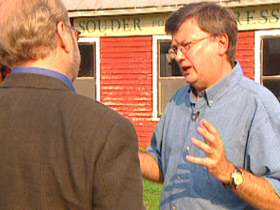
And why is that?
My opposition to John Kerry isn’t just on what I would term evangelical or social issue grounds. I believe he would be a disaster in the international arena, in foreign policy. He’s been inconsistent in how he would handle terrorism. I disagree with his economic philosophies, which I don’t think are necessarily driven by my evangelical theology, although they might be shaped by it. But I also believe on the social issues — whether it’s abortion, whether it’s homosexuality, whether we would enforce pornography laws, whether he would aggressively pursue religious liberty around the world — I believe he would be a disaster on the social issues as well. Not as bad as Howard Dean and not even maybe as bad as Clinton, but the difference is that Kerry may be more an actual liberal, committed to be liberal, whereas Clinton was more left but willing to negotiate, because it wasn’t clear he was as philosophically committed to his position, which is ironic, because Clinton’s personal life was so morally bad. I don’t know there’s any evidence that Kerry’s is. Christians were blinded to the fact that Clinton at times would negotiate with you, whereas Kerry is actually probably more liberal in the sense of negotiating. But his personal life doesn’t appear to be as much of a mess.
Do you think politicians ought to be held to the standards or positions of their churches? I was mentioning to you the Catholic Church’s denying communion to some Catholic politicians who are pro-choice. How do you feel about that?
I believe they should. Part of the reason I left the Apostolic Christian Church, although I never gave up my membership or anything, but went to another church, is that I had some disagreements with some of the policies of the church. And I don’t believe that I should stay there to undermine those policies if I don’t agree. I have tremendous respect for that denomination. It was so critical in shaping me. And I probably still more identify with that than my current church in most places. But a minister once asked me, “Mark, there’s lots of other places you could go, if you want to have more moderate views. The people here deserve the right to have a church that has these views.” Now, if you’re going to say, as the Catholic Church, or as a fundamentalist church, or as a Lutheran church, that these are our beliefs, then you ought to have not joined that church if you don’t share them, if they’re fundamental. The question is: Are certain of these things fundamental to that faith? — which has to be decided by the faith. I believe certain things are, in fact, fundamental.
[The reasons I left the Apostolic Christian Church] were more lifestyle questions at the edges. One of the arguments we were having [was] my hair touched my ears, and could I hold a church office? Another thing is, I’m a Notre Dame football fanatic. Could I go to the football games? Should I become more involved in the political system? They weren’t really heavy theological questions, but more application questions that would change certain lifestyle practices inside that faith. The faith has actually adapted over the years, as many do, too. They just adapt more slowly than the rest of society. Those were the types of things. There was nothing major. That’s why I’m real comfortable going back to my home church, where my mom still goes. It’s just that there were subtle differences in whether to go to movies, watching TV shows. They would say I’m more worldly. Most of the world would say I’m still on the right flank.
And do you think that politicians who go against fundamental church positions ought to be punished?
We used to have, and still do, in the Apostolic Christian Church, a term called “a friend.” In other words, just because you aren’t a communion-taking member doesn’t mean you can’t go to that church. It doesn’t mean you’re not a Christian; it doesn’t mean you can’t be saved. The question is, when you belong to a membership, to a group, and that group has a particular position, should you be allowed to keep membership — or, in this case, take communion — as part of that group? If you’re on the board of Planned Parenthood and suddenly announce that you’re pro-life; if you’re going to be in a group that opposes capital punishment, and all of a sudden you’re for it — presumably you’re not going to be part of the board of that group or an active participant in the decisions of that group. Now, whether you should be allowed to retain your membership, if there are multiple things, that’s really what each denomination has to decide. What about if you agree with everything in the Catholic Church except abortion? Is abortion a defining issue in the membership or not? Each denomination has to determine that.
Can we expect to see evangelicals energized in this campaign on behalf of the reelection of President Bush?
Yes. My position is real simple. I’ve already said it: What are you going to tell your kids and your grandkids at this watershed year of which direction our nation’s going to go? How did you vote? Did you vote? Even in states like Indiana, which are probably going to go solidly for George Bush, you ought to be recorded, because you’re going to record your vote on which direction America should go.
Because this is such an important juncture?
My theory is a little bit different than others. A lot of conservative Christians would argue that we’re just declining steadily and falling apart. I believe we’re dividing. It’s the collapse of the middle. We’ve had a rise in conservative evangelicalism, conservative Catholicism, conservative mainline Protestant denominations, conservative Judaism, conservative Muslim faiths. We have a rise in conservatism and a simultaneous rise in liberalism and a collapse in the middle. Therefore, the battle has become more significant. And our challenge in our country, which is really important, if you are a fundamentalist, as I am, [is] that you respect the other side, because with the collapse of the middle, if the one side wins and tries to demolish the other side’s freedoms, we’re in trouble. That’s the tough thing in public policy to try to reconcile, because how do you reconcile abortion?
Is it becoming more important to evangelicals to get involved in politics, to become decision makers and have more of a role in government?
The most conservative group of fundamentalists in the evangelical movement would be the Amish. The Amish in my district — and I have very Old Order Amish, which means no tops on their buggies, and Old Order Amish, which have tops on their buggies, like around Lancaster and other places — in Indiana, in LaGrange County, and in Elkhart County. They are looking at registering to vote for the first time, because even a separatist community like the Amish sees things like health regulations — whether buggies have to have certain license plates or lights on them, how telephone service is going to be, do they get any kind of Medicaid or hospital funding; with these huge costs now, they can’t all just self-fund — what is going to be their interaction? So if the Amish are deciding it’s more important to vote, you would think everybody else would be, too.
Do you feel you have been used and abused by Washington, as you expected to be? Or has it been a little different?
In the first stretch, I was just amazed there were these different Bible studies, there were additional contacts. I was impressed with how many evangelicals and committed Christians there were here in Washington — devout Catholics. When we’re in a Bible study, we don’t even know who’s Catholic, who’s Lutheran, who’s evangelical, because there were so few of us that we were together. So I was astounded when I first got here. And then I realized I’d met most of them in the first couple of months. As that has expanded, it’s more comfortable than it was when I first came out to Washington as a staffer. I believe that there is a false impression around the rest of the country about how hard it is to be a Christian in Washington. There are strong support groups. The fact is members of Congress who deeply disagree with me are perfectly comfortable being friends and talking. It sometimes upsets people when we do the faith-based argument that I refer to Bobby Scott [D-Virginia] as my friend. He and I are friends, even though we go down there and you’d never guess from the debate that we’re friends. Barney Frank and I were both in Colombia together for the swearing-in of President Uribe. We sat with each other. We spent a couple of days with each other. It isn’t that I don’t treat him with decency and he isn’t a great guy and one of the funniest and brightest guys in Congress. I just don’t agree with him on many issues. If you realize that we’re all human beings, that we work together, we’ve tried to work through our differences but sometimes in this environment we can’t, then you can hold to your principles. But if you don’t have firm principles when you come to Washington, the place will grind you down. That’s really what a lot of people see. If you come out here as kind of wishy-washy, you’ll just sink into looking for power, seeking fun, looking for the best deal. Your marriage will break up. You’ll probably turn to alcohol or other things to try to calm yourself down and pump yourself up. It is a different environment if you don’t come in with principles.
I notice you have the Ten Commandments over there by your desk. Why is that?
The Ten Commandments are the closest thing we have to a foundational set of principles that are both in the Old Testament and reinforced in the New Testament. The specific reason I have them in my office is that, a number of years ago, after we introduced a bill that would allow the posting of the Ten Commandments, a group from my district came in and presented them to me. I said I would keep them in my office. We also have them posted in our district office as well. I believe they are foundational principles. The first four relate directly to honoring God. Sometimes, when people say, “Are you concerned about the language on television?” I’m more concerned about the blasphemy than the crudity. The crudity just shows people are crude and they’re wrong and it’s immoral. But the blasphemy is taking our Lord and Savior’s name in vain. Read the Ten Commandments and understand why some people don’t want them posted. It’s because they are a warning that the Lord is God, and do not take his name in vain, and honor him, and put no other gods before him. That is a rebuke to much of what happens in our society.

